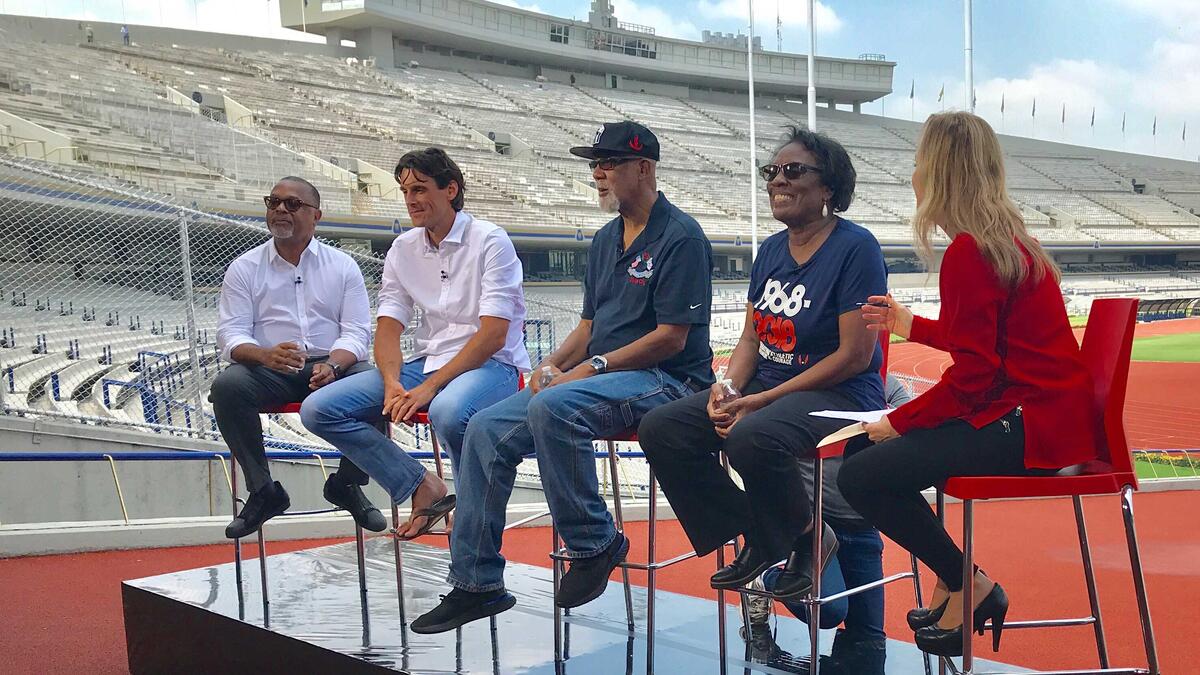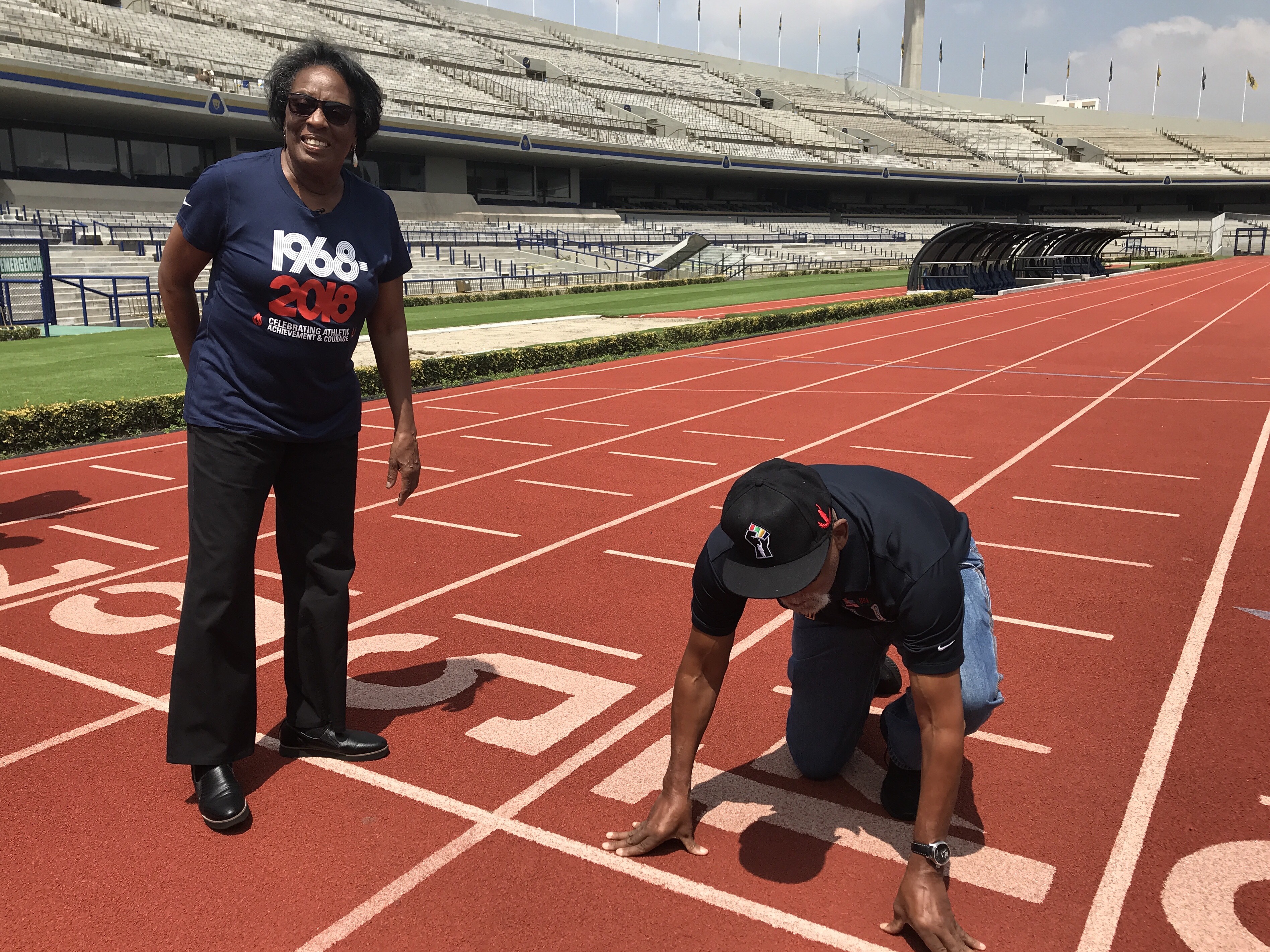Raised fists, rising hope: 50 years later, activist athletes reflect on Mexico City Olympic Games

When Wyomia Tyus and John Carlos stood in the Olympic Stadium in Mexico City for the first time in 1968, they helped launch a movement of athletes raising their voices — and in the case of John Carlos, raising his fist. Their goal was to bring light to racial inequality in the United States. A half-century later, their message still rings loud in stadiums around the world.
On Monday, Carlos and Tyus returned to Mexico City as guests of ASU’s Global Sport Institute and the Universidad Nacional Autónoma de México (UNAM). On the track of the Olympic Stadium, home to UNAM’s Pumas soccer team these days, the athletes reflected on modern sports activism. They were joined by another athlete and social activist, Chris Kluwe, a former punter for the Minnesota Vikings well known for his outspoken support of same-sex marriage and whose career's premature end many see as a result of his activism.
When Tyus walked through the entrance to the stadium on Monday, accompanied by her daughter, she said she could feel the chills. It was the first time she had returned to the track where she set a world record for the 100-meter sprint and became the first person to win the 100-meter in two consecutive Olympics, having won it four years earlier in Tokyo as well.
Similarly, for Carlos, the stadium is more than a building or a reminder of a moment in time.
“It’s a living organism,” he said. “That stadium breathes.”
But for a moment, on Oct. 16, 1968, the stadium did not so much breathe as hold its breath. On that day, Carlos and fellow American Tommie Smith took to the podium to claim their bronze and gold medals in the 200-meter sprint. They stepped onto the podium wearing no shoes, only black socks, which represented black poverty in the U.S. Pinned to their chests were badges for the Olympic Project for Human Rights, an organization established by Smith, Carlos and others to fight racial segregation and racism in sports. Most famously, they each wore a black glove on one hand. When the American national anthem began to ring out through the stadium, they raised their gloved fists and bowed their heads.
“The whole stadium got quiet,” Tyus said. “That’s what I heard. I heard nothing.”
Olympians Wyomia Tyus and John Carlos on Monday visit the track where they competed in the 1968 Olympics in Mexico City. Photo by Mia Armstrong
Soon after, silence morphed into mumbles, which quickly gave way to both boos and cheers. From Olympic officials, the response was harsh — Smith and Carlos were banned from the Olympic Village and expelled from the games.
Carlos and Smith’s gesture has been ubiquitously memorialized as a Black Power salute. But for Carlos, its significance was broader: It was a symbol in support of human rights.
It was also a symbol that had a profound impact on the world, and particularly on Tyus. In a relay race later in the games, she wore black shorts in support of Smith and Carlos and dedicated her medal to them.
Tyus and Carlos reflected on the lasting legacy of their Olympic stories at a public event Monday evening organized by the Global Sport Institute and UNAM entitled “The Power of Sports Activism: From Black Power in Mexico ’68 to the Trump Era.” The event, held on UNAM’s campus, featured Carlos; Tyus; Kluwe; Kenneth Shropshire, the CEO of the Global Sport Institute and ASU’s Adidas Distinguished Professor of Global Sport; as well as Georgina González and Juan Villoro, two leading sports journalists and commentators in Mexico.
Villoro reflected on the profound and wicked effects of racism in the U.S. and Mexico, noting that sports can be a space for both deliberation and manipulation. The salute at the ’68 Games, Villoro said, marked a “before and after” in the world of sport, as well as in the world of civil rights.
Kluwe is part of the “after ’68” generation of athletes and social activists. But similar to Carlos and Tyus, Kluwe’s decision to raise his voice against social inequality was met with icy consequences. Kluwe’s experience was a demonstration of what González identified as an overarching principle of sport and social activism: Those willing to sacrifice their positions of privilege are those who will be able to affect meaningful change.
“It is incumbent on us to show that the world can be a better place,” Kluwe said. “In America, we still have much work to do.”
Carlos and Tyus agreed that not enough has changed since they brought the world’s attention to their fight for social equality in 1968. Today, players like Colin Kaepernick follow in their footsteps — a reflection of the fact that politics are inextricably linked to sports, the athletes said, even if some might prefer to think of them as separate. Kluwe argued that to say there should be no politics in sport is in itself a political statement.
Carlos remains hopeful thanks to the idea that, five decades on, people can look back on his raised fist and find a reason to continue their own fight for social justice. “Everything we did was for this moment,” he said.
And Tyus, who remembers being annoyed as a child when told that she should wear a cowgirl outfit when she wanted to play at being a cowboy, credits the Tennessee State Tigerbelles track program and its legendary coach Ed Temple for opening her path to being not only an Olympian, but someone who could speak up for those without a voice, to try to improve the world.
Running opened the door for her, Tyus told the audience in the UNAM auditorium, “but education kept it open.”
For Shropshire, these moments of reflection are at the core of the Global Sport Institute’s mission. “If we understand the past,” he said, “we can do better today and in the future.”
Written by Mia Armstrong. Top photo: (From left) Kenneth Shropshire, Chris Kluwe, John Carlos and Wyomia Tyus are interviewed at the Olympic Stadium in Mexico City on Monday. Photo by Mia Armstrong
More Law, journalism and politics

Veteran journalists Jorge Ramos and Marty Baron talk democracy and free press
Arizona State University hosted "Truth Across Borders," a bilingual panel featuring two of America’s most iconic journalists, last week in the Evelyn Smith Music Theatre on Arizona State University's…
Can elections results be counted quickly yet reliably?
Election results that are released as quickly as the public demands but are reliable enough to earn wide acceptance may not always be possible.At least that's what a bipartisan panel of elections…
Spring break trip to Hawaiʻi provides insight into Indigenous law
A group of Arizona State University law students spent a week in Hawaiʻi for spring break. And while they did take in some of the sites, sounds and tastes of the tropical destination, the trip…


